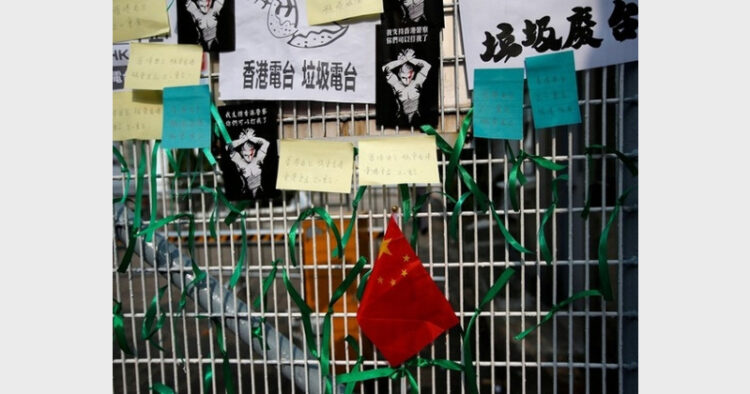'Media Warfare' has become an explicit part of Beijing's military strategy aimed at undermining democratic norms, eroding national sovereignty, weakening the financial sustainability of independent media, and violating local laws.
Beijing: China is using a variety of strategies, including ramping up international broadcasting, undertaking extensive advertising campaigns, and infiltrating foreign media outlets to counter criticism and spread its propaganda.
According to a report titled "China's Pursuit of a New World Media Order" released (December 7) by Reporters Without Borders (RSF), Beijing is actively trying to influence the global media to spread its world view, reported The HK Post. The Chinese government is reportedly investing USD 1.3 billion annually to increase Chinese media global presence. Chinese state-run television and radio shows have significantly expanded their international outreach with this investment.
China Global Television Network (CGTN) is televised in 140 countries, and China Radio International (CRI) is broadcast in 65 languages. Proxies like StarTimes are also used for increasing control over global telecommunications networks while building new digital highways, reported The HK Post.
Some of the prominent Chinese propaganda machinery active globally includes Chinese Communist Party Propaganda Department (CCPPD), State Council Information Office (SCIO), United Front Work Department (UFWD), BRICS Media Forum (BMF), World Media Summit (WMS), Confucius Institutes (CIs), China International Publishing Group (CIPG), Xinhua, China Daily and Global Times.
As part of these propaganda efforts, China is seeking collaboration with media groups in Africa and ASEAN. Recently, China Media Group (CMG), in collaboration with the African Media house, held (November 26) an event under the theme "Our African Partners: CMG Media Cooperation Forum 2021".
Earlier, in July, during the '2021 ASEAN Media Partners Forum,' CMG initiated a partnership with ASEAN media to promote mutual cooperation.
China's influence over overseas media is also apparent with the takeover of leading Chinese Diaspora Media, such as New Zealand's Chinese Herald and Australia's Pacific Times. These two media segments were earlier independent and critical of the Chinese regime, but have become propaganda mouthpieces after the takeover, reported The HK Post.
Within China, the media is tightly controlled, with the country ranking 177 in the 2021 World Press Freedom Index, just two places above North Korea. However, abroad, Beijing has sought to exploit the vulnerabilities of the free press to its advantage. 'Media Warfare' has become an explicit part of Beijing's military strategy aimed at undermining democratic norms, eroding national sovereignty, weakening the financial sustainability of independent media, and violating local laws.
China is trying to reshape the global information environment with the massive infusion of money, including funding for advertorials, sponsored journalistic coverage and Chinese propaganda supplements that appear in dozens of respected international publications such as The Washington Post, reported The HK Post.
China woos journalists from around the world with all-expenses-paid tours, providing free graduate degrees in communication, training scores of foreign reporters each year to 'tell China's story well' in addition to buying stakes in foreign media outlets.
Beyond Africa, Chinese companies are playing a role in the digital television expansion in countries like Pakistan, Cambodia, and East Timor, reported The HK Post.
The blurring lines between China's journalism, propaganda work, influence projection and intelligence-gathering is a concern for many foreign governments, particularly at a time when due to financial constraints, even western journalists seem vulnerable to Chinese enticements.
Courtesy: ANI














Comments